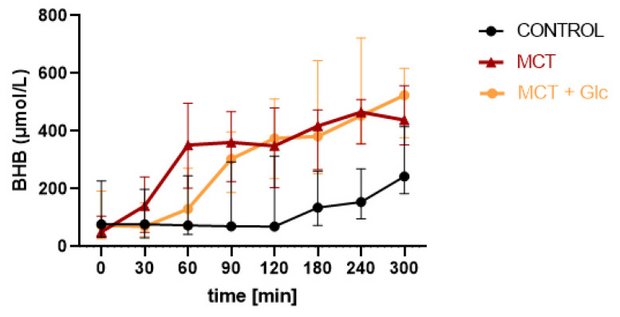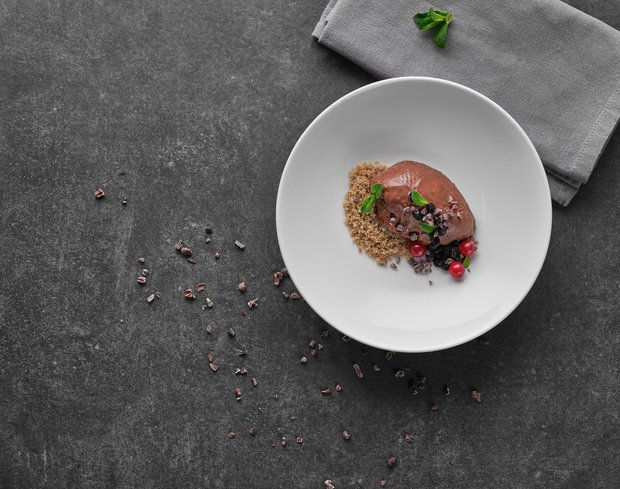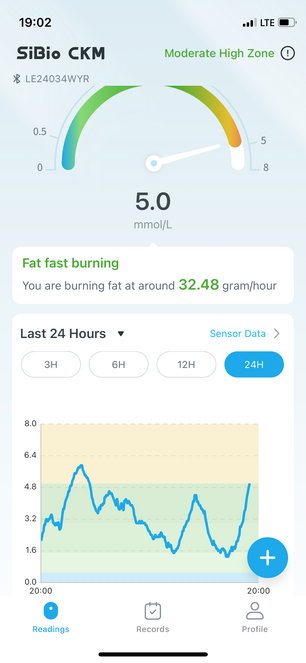WHAT HAVE
MCT OIL, FASTING, KETO NUTRITION & KETONE BODIES
HAVE TO DO WITH EACH OTHER?
To understand the context, let's first examine the following:
WHY IS FASTING HEALTHY?
Put simply, our body can use fats, carbohydrates and proteins to generate energy. Proteins and fats are considered essential nutrients, while carbohydrates are optional. More on this later.
If we do not consume any carbohydrates (e.g. sugar, starch...) over a longer period of time, the body will enter a fasting metabolism at some point. (Of course, the glycogen stores are emptied first, etc., but for the sake of simplicity we'll take a shortcut here)
Once we have reached the (correct) fasting metabolism, the following happens: So-called ketone bodies are produced in the liver as an alternative energy source. (Yes, we can also "burn" fatty acids directly and yes, gluconeogenesis (= synthesis of glucose) is also carried out from fats and proteins, but here too: We keep the explanation simple because it's about the principle and not about educating scientists).
However, these ketone bodies are not only a source of energy for us, they also stimulate some exciting processes such as reducing inflammation, restoring insulin sensitivity and detoxification. What can this mean for us? More on this below.
Incidentally, this was even reported on years ago in the German Medical Journal:
https://www.aerzteblatt.de/nachrichten/61898/Fasten-Antiinflammatorischer-Effekt-ueber-Beta-Hydroxybutyrat
But apart from all the modern research: In many cultures, there has always been a custom of fasting... So people have known about the associated benefits for a long time...
Short and simple:
Fasting is healthy because the ketone bodies produced during fasting stimulate processes in the body that "make us healthy".
YES
There are - and they are:
KETOGENIC DIET
If you avoid carbohydrates in your diet and make sure that you don't eat too much protein, your body can remain in a metabolic mode similar to fasting despite food intake. This form of nutrition has been used successfully for 100 years to treat a wide variety of illnesses and is a major, important chapter in itself.
EXOGENIC KETONES
Certain ketone bodies can also be taken as food supplements.
Medium-chain triglycerides = MCTs
These occur naturally in foods that are usually rich in saturated fats, including milk and coconuts. Side note: sheep's milk and products are naturally particularly rich in MCTs However, there are also MCT extracts in the form of oils and these are particularly exciting in the kitchen because they can easily be added to salads, for example, or in addition to all fatty dishes. They can also be used to make great, creamy hot drinks such as coffee or tea. The American biohacker Dave Asprey copied the principle of butter tea from the Sherpa people in Nepal and developed his Butter+MCT coffee from it.
MCTs are absorbed in the body directly in the duodenum without the use of fat-splitting enzymes (lipase) and processed into ketone bodies in the liver.

This means in plain language:
MCTs initiate much of the benefits of fasting (or a ketogenic diet) without actually fasting ;)
https://pubmed.ncbi.nlm.nih.gov/36904147/
https://pubmed.ncbi.nlm.nih.gov/35911092/
The following diagram from the above study shows that the ketone bodies in the blood also increase when something is eaten and MCT oil is also consumed.
(red = MCT only, yellow = MCT+sugar, black = fasting)
What does this mean in practice?
Regardless of why you have ketone bodies circulating in your blood, the decisive factor is what effects this has in practice.
There are many different topics that have already been researched here.
We present the most important ones below:
Increased cognitive performance
https://pubmed.ncbi.nlm.nih.gov/33220329/
Alzheimer's dementia prevention
https://pubmed.ncbi.nlm.nih.gov/35718870/
Weight loss support
https://pubmed.ncbi.nlm.nih.gov/12975635/
Prevention or improvement of
Metabolic syndrome, T2 diabetes and microbiome
https://pubmed.ncbi.nlm.nih.gov/27187452/
Anti-inflammatory modulation of the immune system
https://pubmed.ncbi.nlm.nih.gov/17570262/
Anti-aging
https://pubmed.ncbi.nlm.nih.gov/34684426/
https://www.sciencedirect.com/science/article/pii/S1279770724004834?via%3Dihub
Cancer
https://pubmed.ncbi.nlm.nih.gov/38189128/
https://pubmed.ncbi.nlm.nih.gov/36432618/
https://pubmed.ncbi.nlm.nih.gov/35477756/

How can I use MCTs?
As MCT oils are practically tasteless and odorless, they can be used in a variety of ways:
- Mixed in hot drinks
- In salads
- In desserts such as puddings, creams, cakes...
- As a supplement to fatty dishes such as ham & eggs, dumplings with egg, schnitzel etc.
ATTENTION: MCT oils should not be used for frying.

Why in drinks?
Mixing it in hot drinks such as coffee, tea, cocoa, milk... is particularly popular and exciting.
The reason: the emulsion increases the ketone body-producing "ketogenic" effect - see an interesting study from 2017 which found that between 2 and 4(!) times as many ketone bodies were formed as a result:

URINE TEST STRIPS
This inexpensive test variant is very inaccurate, but easy to perform.
ATEMTEST
There are test devices that can measure the content of end products of ketone body production in the breath. Advantage: No test strips necessary, disadvantage: Very inaccurate.
KAPILLAR BLOOD
Similar to blood glucose meters, there are also devices that can measure the level of ketone bodies in the blood. Advantage: Very accurate, disadvantage: "pricking" required and separate disposable test strips are needed which are considerably more expensive.
CKM SENSOR (Continuous Ketone Measurement)
All 3 variants mentioned above have the disadvantage that they are snapshots. A new alternative is a CKM sensor which, like a CGM sensor, is attached to the triceps for 14 days and transmits the current measured value to the cell phone at short minute intervals. In my opinion, this system is the best option for finding the right dose in relation to other keto measures (intermittent fasting, sport, diet), especially at the beginning.
There are also clinically noticeable benefits over time. People report increased energy, mental clarity, mental focus, better sleep and more.
Personally, I try to average between 2 and 3 mmol/l - that feels best for me.

What are the differences between MCT oils?
Or: What should I look out for when buying?
- What is the extract made from? Inexpensive MCT oils are made from palm oil, high-quality ones from coconut.
- Degree of purity? How many other fatty acids are contained that could possibly cause side effects?
- BIO quality? How high is the risk of contamination?
- Which fatty acids are included? C10 is cheaper, but unfortunately more likely to cause digestive problems than C8.
For these reasons, our BIO C8 MCT oil is made from BIO coconuts, is highly pure (99%) and contains only the preferred fatty acid caprylic acid (C8).
TO THE SHOP
Disclaimer
The information and recipes contained on this platform and linked media reflect my personal experience only and are provided for informational purposes and as culinary inspiration. The recipes and nutritional information do not constitute medical advice, diagnosis or treatment and are not intended as a substitute for professional medical advice or treatment. Any recommendations reproduced in the media we maintain are not a substitute for advice from medical professionals or nutritionists. Readers with specific health concerns, food allergies, individual dietary needs or medical conditions should seek professional medical advice before implementing the recipes or dietary recommendations described herein. The author, publisher and operator of this platform accepts no responsibility for any health problems or damage that may arise from the use of the recipes or information contained on this platform. It is strongly recommended that you seek qualified medical advice or consult a nutrition specialist if you have any health concerns or before changing your current dietary habits. The authors and publishers of this media assume no liability for the accuracy or completeness of the information and recipes provided and it is the responsibility of the reader to take allergic reactions, food intolerances or other health concerns into account. Furthermore, neither the authors, publishers nor operators assume any guarantee or liability for the effectiveness of the measures presented. Zarastro GmbH is not responsible for the content of websites accessed via hyperlinks.